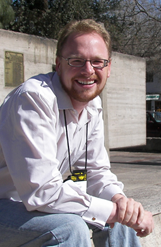Individual-based study of the Sable Island horses: effects of local density on their ecology and evolu-tion

Philip D. McLoughlin
University of Saskatchewan, Saskatoon, Canada
philip.mcloughlin@usask.ca
In 2007, Philip initiated a long-term, individual-based study of an isolated population of feral horses (Sable Island, Nova Scotia, Canada). Sable Island is a long (49 km) and narrow (1.3 km) sandbar 175 km southeast of Halifax, in the Atlantic Ocean. The feral horses (numbering 552 individuals in 2014) were introduced in the mid-1700s, and exist without predators, human interference, and interspecific competition (they are the island’s only terrestrial mammal). The setting is ideal for studying the role of conspecific density on the ecology and evolution of the horse population. With near 100% resighting probability (based on photography), the highly approachable horses are tracked to obtain individual-based data on movements, biological samples (including genetic material), sociality, and life histories (>850 life histories tracked to date). In this talk, Philip will highlight the project’s recent papers on density-dependent habitat selection and the role of the environment and local density in shaping opportunities for selection. Philip is an Associate Professor at the University of Saskatchewan, in Saskatoon, Canada.
Recent publications:
- Manning, J.A., S.A. Medill, and P.D. McLoughlin. (2015) Climate fluctuations interact with local demography and resources to predict spatially dynamic adult sex ratios in a megaherbivore. Oikos (early) doi 10.1111/oik.02273.
- Rozen-Rechels, D., F. van Beest, E. Richard, A. Uzal, S.A. Medill, and P.D. McLoughlin. (2015) Density-dependent, central-place foraging in a grazing herbivore: competition and trade-offs in time allocation near water. Oikos (early) doi 10.1111/oik.02207
- van Beest, F.M., Uzal, A., Vander Wal, E., Laforge, M.P., Contasti, A.L., Colville, D., and McLoughlin, P.D. (2014) Increasing density leads to generalization in both coarse-grained habitat selection and fine-grained resource selection in a large mammal. Journal of Animal Ecology 83: 147–156.
Contact Aurélie Coulon : aurelie.coulon@cefe.cnrs.fr
Contact du Comité SEEM : seem@services.cnrs.fr.
Contact du Labex CEMEB: gestion.cemeb@univ-montp2.fr, www.labex-cemeb.org.


